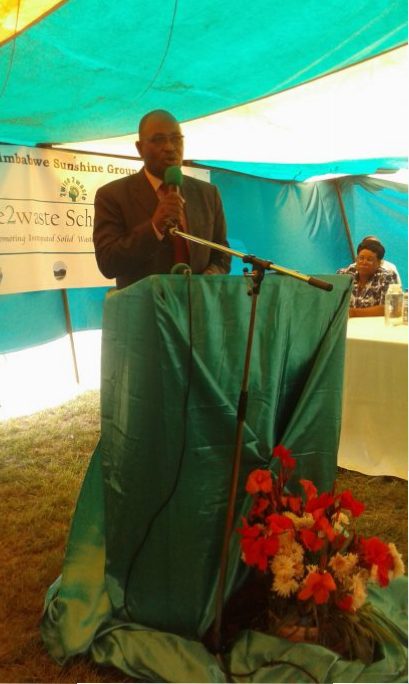By Patricia Mashiri and Joyce Mukucha
In pursuit of enhancing a positive attitude by authorities and learners in the school to learn in a litter free environment, the Zimbabwe Smart Group (ZSG) in conjunction with Environmental Management Agency (EMA) has launched a campaign which focuses on raising awareness on good waste management.
The campaign’s thrust is also bring change of attitude within schools as well as communities so that they become instrumental transformation agents.
Speaking during the Zero Tolerance to Litter campaign in Harare, Glen View High 1 School on the 23rd of March 2018, Ambassador Zenso Nsimbi, the Chairperson of Environmental Management Board stressed that the campaign would be sustained at a community level.
He said the issue of littering in and around the school sites was topical, hence there was need for everyone to contribute in taking remedial action.
“The participation of the school administration, teachers, staff and learners in promoting good waste management practices will result in a litter-free school environment. Good waste management practices make the environment and our surroundings clean and habitable. Therefore, I’m urging every school in the country to adopt strategies enshrined in the Integrated Waste Management Plan which are aimed at reducing the total amount of waste ultimately disposed at a landfill,” he said.
As enshrined in Section 73 of the Constitution, Nsimbi urged the schools to focus on three elementary principles of the approach namely; reduce, reuse and recycle. He said the key values were evidently revealed at Glen View 1 High School and other schools must replicate that.
“Schools should reduce the materials used during any activity as that ultimately reduces the amount of waste produce. Reuse any material that is still in a good state and in the process lessening the amount of new material we buy and ultimately what we dispose at landfills. Recycle all material that cannot be reused in its original state and come up with other products different from initial ones,” Nsimbi said.
For the campaign’s sake of progress, Nsimbi said, the Ministry of environment, Water and Climate had come up with a unified thrust where all the Parastatals under it such as (EMA), Zimbabwe National Water Authority, Parks, Forestry Commission and Allied Timber will work together. This would ensure that they come up with model schools where all components of sustainable environmental management will be showcased.
Joyce Maphosa, the Deputy Provincial Education Director for Harare Metropolitan representing the Ministry of Primary and Secondary Education said schools consultants should ensure that there are adequate vats for litter disposal. She reiterated the ministry support of waste management.
“I urge all the school authorities to make sure that there are sufficient bins around the school. Most of the disease outbreaks usually emerge in schools. Therefore, we are thriving to maintain and develop green schools like the ones in Glen View.”
She also encouraged teachers to put inscriptions in classrooms such as ‘place litter in bins’ so that the children will always bear in mind that they should learn in a free-litter environment.
“A dirty school is prone to diseases so let us turn them into a clean environment. In a well-coordinated manner, let’s all become agents of positive transformation of our communities. Sustainable waste management is the subject dear to my heart. Therefore, there is need for initiatives to be lobbied so that Zero Tolerance to Litter will be achievable,” she said.
In his remarks, Ronnie Mbaisa, the Founder and Director of ZSG said his organisation partnered with the Ministry of Primary and Secondary Education with the aim of finding solutions that could help to reduce litter.
Mbaisa pointed out that ZSG was committed to support the biggest mandate of the Zero Tolerance to Litter campaign with different approaches. The organisation’s thrust, he said, was to ensure proper programming of waste management.
“For the project to become a success, I encourage everyone to take responsibility and bear in mind that we want young people for a clean and climate smart Zimbabwe. Our aim is to protect the environment in schools as well as the nation at large,” Mbaisa said.






